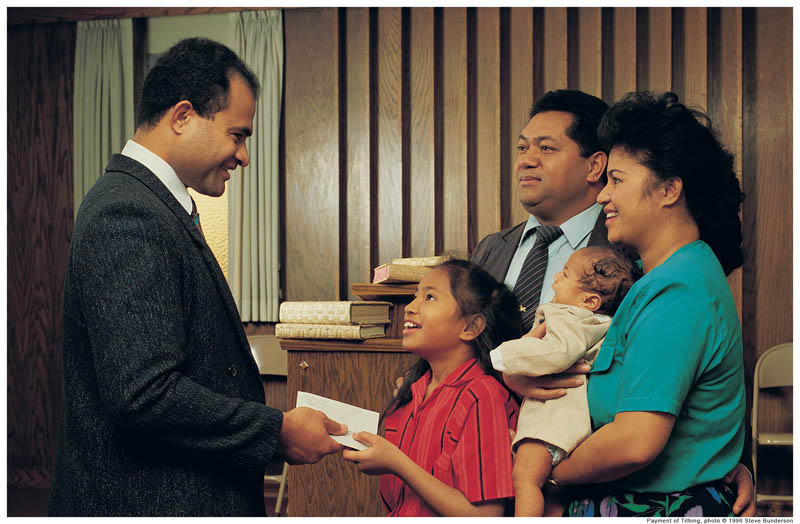The Bible teaches the law of tithing beginning early in the Old Testament. The word tithing means tenth and so Mormons, as do others who follow the Bible, pay one-tenth of their increase (see Deuteronomy 14:22). Increase refers to income. It is left to individual Mormons to decide what income involves. Various Mormons interpret it in different ways, but we are asked only to take it to God for clarification.
The first mention of tithing is in Genesis, when Abram paid his tithes to Melchizedek. From that time on, if not before, God’s children have been asked to pay tithes. “And all the tithe of the land, whether of the seed of the land, or of the fruit of the tree, is the Lord’s: it is holy unto the Lord (Leviticus 27:30).
Although it can feel challenging to suddenly begin turning over so much of your income to God, it is important to remember that without God, we have nothing at all. When I teach little children, I often tell them I will give them ten pennies. I then ask if they would be willing to give one back—but not to me. I ask them to give it to God. We spread the pennies out and each child sees that he gets to keep a lot more pennies than God does, even though it is because of God they have the pennies. (I wouldn’t be giving them out if I weren’t teaching God’s commandment.) They consider that quite fair.
Then we go for a walk around the church building and I show them all the things in the building tithing paid for. After a few minutes, they realize every small detail was paid for with tithing and they get excited to point them out. It costs money to run a church, just as it costs money to run your own home. Even though a Mormon church building is very simple, it still costs money to build. Furniture must be purchased. Cleaning supplies are bought to keep God’s home nice. Although the Mormons have a lay church and so don’t need money to pay their ministers, organists, or teachers, those people need supplies. So they don’t have to spend their own money on their volunteer service, a budget is provided for each program. Teachers are given detailed lesson manuals with full-color pictures, crayons, paper, scissors, and other teaching materials. The activities of the teens, with the exception of one camp a year, are all funded by the budget.
There are expenses beyond the meetinghouse as well. Although missionaries pay their own way, they need pamphlets, Bibles, copies of the Book of Mormon and other materials to give those they visit. Temples are built for sacred ordinances and these cost money. Humanitarian aid, both for Mormons and non-Mormons, must be funded.
Mormons do not pass a collection plate. If you visit a Mormon church, you will find it very difficult to spend any money on a Sunday. There are no shops, restaurants, hair salons or other shopping opportunities in the chapels. Mormons do not believe in shopping on Sundays. To pay tithing and offerings, Mormons pick up an envelope from a rack near the bishop’s office. (A bishop is a lay minister.) They fill out the form with their name and address and insert their check or cash into the envelope. At some point during the three hours of church meetings, whenever they encounter them, they hand it to the bishop or one of his two counselors. It is done quietly without recognition and so that members of the congregation are not aware of who paid and who did not. There is no public record of donations, although church leaders have records of them, and a large tithing is not treated as better than a small one. The same ten percent applies to everyone, rich or poor and the widow’s mite is valued as much as the millionaire’s tenth. In fact, the millionaire will get nothing more from God or from the Church for his large donation and in fact, as Jesus pointed out, the widow’s gift took more sacrifice and came with greater rewards.
41 And Jesus sat over against the treasury, and beheld how the people cast money into the treasury: and many that were rich cast in much.
42 And there came a certain poor widow, and she threw in two mites, which make a farthing.
43 And he called unto him his disciples, and saith unto them, Verily I say unto you, That this poor widow hath cast more in, than all they which have cast into the treasury:
44 For all they did cast in of their abundance; but she of her want did cast in all that she had, even all her living (Mark 12, King James translation, New Testament.)
Why are Mormons so willing, and even eager, to pay their tithing? They do it to show faith in God and to demonstrate trust in Him.
Robert D. Hales, a Mormon apostle, said,
Tithing develops and tests our faith. By sacrificing to the Lord what we may think we need or want for ourselves, we learn to rely on Him…. the obedient payment of tithing fortifies our faith, and that faith sustains us through the trials, tribulations, and sorrows in our life’s journey.
Robert D. Hales, “Tithing: A Test of Faith with Eternal Blessings,” Ensign, Nov 2002, 26
Malachi promised, in the Old Testament, great blessings to those who choose to pay their tithing and also explained what is really happening when you decide not to tithe:
8 Will a man rob God? Yet ye have robbed me. But ye say, Wherein have we robbed thee? In tithes and offerings.
9 Ye are cursed with a curse: for ye have robbed me, even this whole nation.
10 Bring ye all the tithes into the storehouse, that there may be meat in mine house, and prove me now herewith, saith the Lord of hosts, if I will not open you the windows of heaven, and pour you out a blessing, that there shall not be room enough to receive it.
11 And I will rebuke the devourer for your sakes, and he shall not destroy the fruits of your ground; neither shall your vine cast her fruit before the time in the field, saith the Lord of hosts (Malachi 3).
Malachi shows us the blessings from giving God His share. However, people sometimes misunderstand this verse. They think paying tithing will result in material wealth. Malachi does not mention money. He says we will receive blessings so great we can’t measure them, but there are many types of blessings and the best ones are not financial.
Gordon B. Hinckley, a past Mormon prophet, said,
Now, do not get me wrong. I do not say that if you pay an honest tithing you will realize your dream of a fine house, a Rolls Royce, and a condominium in Hawaii. The Lord will open the windows of heaven according to our need, and not according to our greed. If we are paying tithing to get rich, we are doing it for the wrong reason. The basic purpose for tithing is to provide the Church with the means needed to carry on the Lord’s work. The blessing to the giver is an ancillary return, and that blessing may not be always in the form of financial or material benefit (Gordon B. Hinckley, “The Sacred Law of Tithing,” Ensign, Dec 1989, 2).
Many people have discovered that when they pay their tithing, they have enough to cover all their necessities—not necessarily their luxuries—even if their budget seemed to have no room in it for a ten percent tithing. These tithing miracles are small testimonies of the Biblical commandment to tithe and cause some to say they cannot afford not to pay their tithing. However, it is not the miracles that convert people to tithing. Mormons, like other Christians, pay tithing because God, who gave them everything, has asked for a little bit back and they are happy to give it to Him. If the Savior were to arrive in person and ask a Christian for ten percent of his increase to help with God’s work, most Christians would be thrilled to be asked to help.
Through the Bible and modern day revelation, we know this is exactly what has happened. God and Jesus Christ have asked us for a ten percent donation to help with the work of the Kingdom. Our faith will determine our response.
About Terrie Lynn Bittner
The late Terrie Lynn Bittner—beloved wife, mother, grandmother, and friend—was the author of two homeschooling books and numerous articles, including several that appeared in Latter-day Saint magazines. She became a member of the Church at the age of 17 and began sharing her faith online in 1992.







